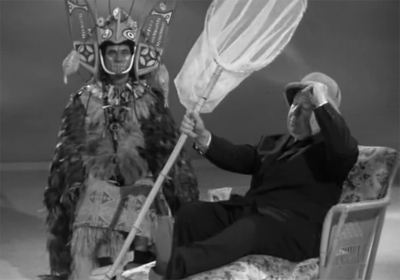
As part of the “For the Love of Film” blogathon, I’ll be taking a look at Alfred Hitchcock’s contributions to his celebrated anthology series Alfred Hitchcock Presents. I’ll be looking at some of the episodes of the classic show that he directed. The “For the Love of Film” blogathon this year is raising money to keep one of Hitchcock’s earlier works, The White Shadow (which he wrote, edited, designed and assistant-directed), available on-line and streaming for free. It’s a very worthwhile cause and you can donate here.
Banquo’s Chair has a rather standard little plot. There’s no sense that any of the ideas are overcrowding one another, or that they’ve been rushed along to fill the twenty-five minute slot. Indeed, the plot and the script are about as standard as they could be, using a simple set up to play through a familiar drama and leading to a somewhat trite and predictable conclusion. Without being harsh, I think that’s a fair description of Banquo’s Chair. However, it is well served by an experienced cast and by Hitchcock’s direction. Neither truly distinguishes it from the rest of the series, but they do elevate a fairly simple set-up into an entertaining little adventure.
In fact, you can tell that Hitchcock himself was aware that the story lacked a bit of substance. His intros and outros feel just a little bit more developed than usual, a little extended beyond the typical length. It seems that the director and his producers realised that there was only so far they could extend Banquo’s Chair, and stretched Hitchcock’s section of the show to take up the slack. Not that I’m complaining of course, Hitchcock’s appearances are always at least entertaining, and this time is no different.
Hitchcock is in full scathing and sarcastic mode as he offers a trip to Hollywood in the style of a nineteenth century expedition into the deepest and darkest jungles of the furthest continent. “Welcome to Darkest Hollywood,” he greets us. “It is so quiet one can hear a name drop.” Okay, the gag might itself end up expanded a little bit too much for comfort, but there’s something inherently charming about Hitchcock’s surreal appearances framing the episodes. Even where the episodes in question might be weak, Hitchcock’s sections are always watchable.
Banquo’s Chair has a nice enough set-up, the type of thing that one could imagine from a high concept thriller. Inspector Brent is a retired Scotland Yard inspector trying to close that one open case – the murder of a wealthy woman. Brent knows who did it, but he can’t prove it. The nephew has an airtight alibi. So Brent conspires to invite the gentleman to dinner and to scare him into confessing his crimes using good old-fashioned theatricality.
It isn’t the most original concept, but at least the script’s title alludes to a rich line of similar stories. Hell, one of the guests at dinner is even appearing in a production of MacBeth, as if we didn’t get the reference. “I haven’t had a chance to see it,” the murderer confesses, seeming disappointed. Ah, irony. Don’t worry, kiddo, you’ll be getting your own special theatrical performance this very evening. Just be careful what you wish for. And, of course, this isn’t just an average dinner, oh no. “It was on a night something like this, I recall,” the murderer muses of the night his aunt dies, before specifying that it was… “two years ago tonight.” Dun dun dun!!!
In fairness, there are several interesting angles the script could take. After all, the characters dwell quite a bit on the fact that Inspector Brent is retired. Watching the episode, one almost expects somebody to question the character’s obsession with the case, or even the sanity of his unorthodox scheme. Brent does show hints of focusing just a little bit too much on the subject, and seems reluctant to let go. “It was my case to begin with,” the inspector insists, “and I don’t like it remaining unsolved.” He even acknowledges his somewhat strange method of extracting a confession from the subject. “The Yard would never permit it if I was still there, of course.”
However, the episode – sadly – isn’t too interested in Inspector Brent. John Williams, as ever, gives a great performance, but Brent is nothing more than a plot device, and the episode never really deals with the ethical or moral or legal implications of his scheme. Scotland Yard might not have permitted this experiment, but they do station an officer nearby to hear the confession. That’s before one considers the admissibility issues around a confession that was gleaned under such questionable circumstances.
Of course, the plot isn’t too bothered with any of these, because it’s all a set up for the final scene. This can’t help but feel a bit disappointing. Roald Dahl’s episodes (for example, Lamb to the Slaughter and Mrs. Bixby and the Colonel’s Coat) could work a similar vibe, but Dahl’s writing was typically strong enough to support such a set-up. Banquo’s Chair really isn’t that interesting on such a level.
So Hitchcock steps in. It’s interesting to note how he tends to react to scripts. He’s generally relatively passive if the story itself is interesting enough, willing to stand back and let the story breathe a bit. Here, it seems almost like the director is trying to compensate for some inherent scripting problems. Despite the fact this is basically an episode about a bunch of people talking at the dinner table, Hitchcock keeps his work focused and gives us a hint of style. The camera is generally moving, and there are all manner of tight close-ups as tension builds.
John Williams is, once again, in the leading role. I’ve actually come to appreciate the actor quite a bit for his work on Alfred Hitchcock Presents. Here, he does a wonderful job of transforming into Inspector Brent, even though the character is little more than a shell. Williams noticeably changes his accent and shifts his posture slightly to play the retired police officer, and he is – as always – an immensely watchable and talented actor. He takes particular relish in playing the aging veteran as he carefully and meticulously plans the evening. “We won’t bring her on with the soup,” he remarks of the hired ghost. “That would be rushing it. No, we’ll bring her on with the pheasant.”
Banquo’s Chair isn’t exceptional. It isn’t terrible, but it’s not great. It’s a perfectly middle-of-the-road episode. And there’s nothing wrong with that, of course. It does, however, serve to demonstrate how much easier it is to enjoy that sort of average story when it comes from a talented director, working with a talented cast.





